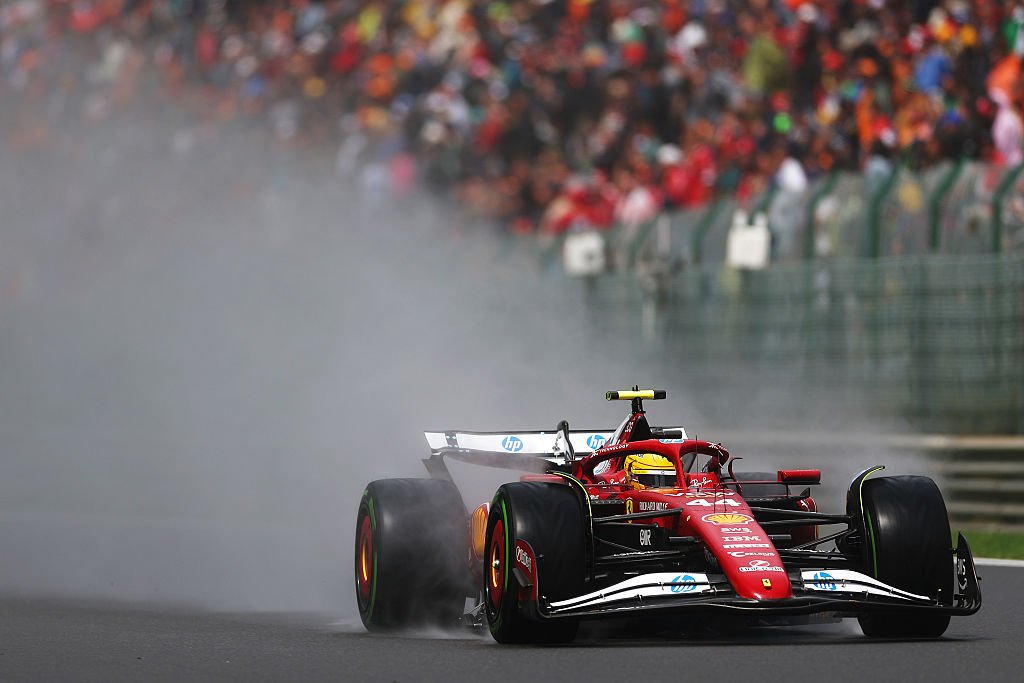Ferrari’s Suspension Upgrade: A Path to Enhanced Performance
Ferrari’s recent advancements in their vehicle’s suspension system have sparked excitement among fans and experts alike, particularly following the implementation of a new rear suspension design during the Sprint weekend at Spa-Francorchamps. Team principal Fred Vasseur has expressed optimism that this upgrade could significantly boost the team’s performance at the upcoming Hungarian Grand Prix, provided the team optimizes it further.
New Rear Suspension: An Overview
The introduction of the new rear suspension at Spa was a strategic decision made by Ferrari, aimed at enhancing the car’s stability and handling characteristics. Despite the tight schedule and limited practice time typically associated with Sprint weekends, Ferrari opted to introduce this crucial upgrade rather than waiting for the subsequent race in Budapest. Vasseur believes that even under the challenging conditions of a Sprint weekend, making such enhancements is vital for the team’s competitive edge.
The Challenges of Sprint Weekends
Sprint weekends present unique challenges for teams in Formula 1, given the abbreviated practice sessions. Teams often have only a short window to gather data and refine their setups. Vasseur acknowledged that the limited time for long stints during practice makes it difficult to establish a comprehensive understanding of how new upgrades will behave on track. However, he remained confident that the decision to implement the new suspension at Spa would serve as beneficial preparation for the next race.
Optimizing Performance at the Hungarian Grand Prix
As the Ferrari team shifts its focus to the Hungaroring, Vasseur emphasizes the importance of fine-tuning the newly introduced suspension components. He noted that while some upgrades can yield immediate benefits, mechanical enhancements often require a period of adjustment and testing to fully understand their impact on the car’s dynamics. This includes analyzing how the suspension interacts with other critical elements, such as braking and ride height.
The Importance of Data and Feedback
Gathering data during practice sessions is crucial for any Formula 1 team, especially when introducing new components. Vasseur pointed out that the short practice sessions at Spa made it difficult to accumulate sufficient reference data. Without extensive data, understanding how the new suspension behaves under various conditions becomes a more complex task. Nevertheless, Vasseur is optimistic about the feedback from drivers Charles Leclerc and Lewis Hamilton, which will be invaluable in fine-tuning the suspension ahead of the race in Hungary.
The Road Ahead: Anticipating Performance Gains
Looking ahead, Ferrari is eager to optimize the new suspension system to unleash its full potential. Vasseur believes that while the immediate benefits may not be apparent, continued refinement and understanding of the upgrade will lead to improved performance over time. The team is committed to maximizing every aspect of the car’s setup in preparation for the Hungarian Grand Prix.
Strategic Decisions in a Competitive Landscape
In the highly competitive environment of Formula 1, making strategic decisions about when and how to implement upgrades is critical. Vasseur acknowledged that while a more gradual introduction of new components may have been preferable, the constraints of the racing calendar necessitated a bolder approach. The decision to debut the rear suspension at Spa, despite the inherent risks, reflects Ferrari’s determination to stay ahead of the competition.
The Role of Aerodynamics vs. Mechanical Upgrades
In Formula 1, teams often encounter a mix of aerodynamic and mechanical upgrades throughout the season. Vasseur highlighted the distinction between the two types of enhancements, noting that while aerodynamic upgrades can provide immediate gains, mechanical changes such as suspension improvements typically require more time to evaluate. This nuanced understanding of how different upgrades affect vehicle performance is essential for teams striving for excellence.
Conclusion
As Ferrari prepares for the Hungarian Grand Prix, the focus remains on optimizing the newly introduced rear suspension system. The team’s commitment to fine-tuning these upgrades, combined with valuable driver feedback, positions Ferrari for a potential leap in performance. In the fast-paced world of Formula 1, where every detail counts, the upcoming race will be a critical opportunity for Ferrari to showcase the benefits of their latest innovations on the track.
